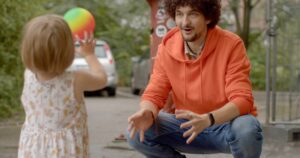The link between engagement & language
Being a children’s therapy clinic, the Speech Pathologists at Cooee Speech Pathology frequently see families who are eager for support to help their child learn to talk; so the child can share their messages, have conversations and make friends at daycare, kindy or school.

Regardless of the child’s age, whether they’re a toddler, kindy-aged or older, our Speech Pathologists will investigate and assess the child’s engagement and interaction skills, as well as their use and understanding of language. This helps us to understand the child’s overall communication profile, and recommend appropriate strategies and therapy goals.
What is engagement?
Engagement is the ability to orient to another person in order to intentionally share spoken (e.g. vocalisations, words, sentences) or unspoken (e.g. gestures, actions, facial expressions, eye gaze/looking) communication behaviours.
When a child is engaged with someone, they will direct their actions and behaviours towards them, while paying attention to them.

Engagement can look like:
- Looking in your direction or to your face while smiling, frowning or showing sadness/crying
- Making noises, vocalisations or babbling towards you
- Watching your face and/or actions while talk to them
- Looking to items you show the child, move to them or point to
- Pulling your hand, touching you or calling you to show/give you something
Children start to develop their engagement skills from birth, with early engagement skills being observed by 3 months of age!
What is language?
Language is the system of words, sounds, and rules used to share and understand thoughts, feelings, and information. It includes understanding and using words, grammar, sentences, stories and social rules of conversation when engaging with others.
Some examples of language include:
- Using words to name the items seen in a story book
- Understanding and doing the instruction a teacher gave
- Using many sentences to share a story about what happened during the day
- Smiling at the person you are speaking with to show them you are interested in them and enjoying the conversation
- Frowning and shaking your head at a child to tell them to stop doing what they’re doing
Language is used in our speaking, reading, writing, and social communication (i.e. facial expressions, gestures, tone of voice, body language, etc.).
Why is engagement important?
Engagement is critical to a child developing their language and overall communication skills, because it supports children to participate in interactions that develop language!
As part of typical communication development, children hear, learn and practice different sounds, words, sentences and stories by participating in social interactions, and watching/paying attention to how people communicate around them. Without engagement, the child misses opportunities to hear and learn language, and they miss opportunities to practice using and refining their own use of language.

So… when we start working with a child who presents with difficulties in their engagement skills and language, we always recommend working on the child’s engagement and interaction skills as one of the first goal/s of therapy.
When we develop a child’s engagement skills first, we often see:
- Increased motivation to learn and use language skills, because social interaction is meaningful to the child
- A natural increase in language skills (e.g. more words, longer sentences, etc.) because the child is now participating in language-learning situations
- More participation in activities and interactions that teach the child specific language skills
When we target language skills without focusing on the child’s engagement skills, we often see more communication frustration, slower language progress and scattered language learning.
If you have more questions about the development of engagement and/or language skills, and/or how a Speech Pathologist can support you, call or email our Client Care team to book with a Speech Pathologist – [email protected] or (07) 3265 4495.
This blog created by Thida Hantun, Certified Practicing Speech Pathologist

